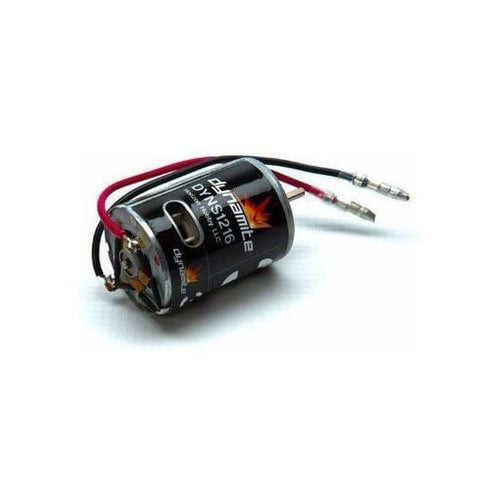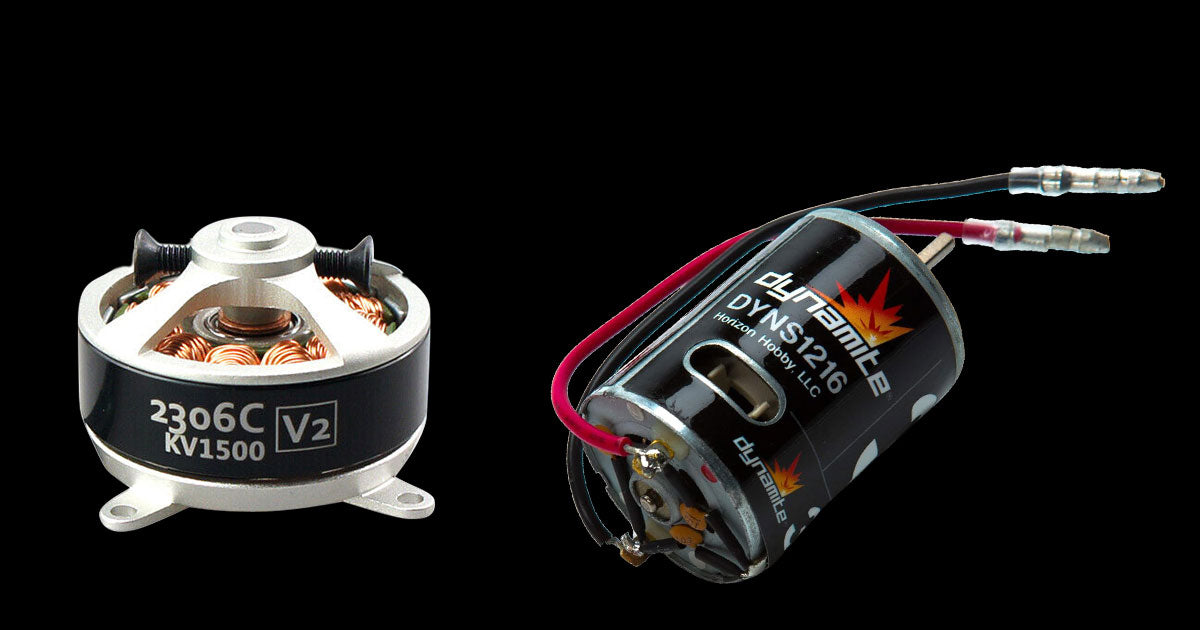Brushed vs. Brushless: Understanding RC Car Motors
Master the essentials of RC motor technology for optimal performance
The world of radio-controlled vehicles has evolved significantly, with motor technology standing at the forefront of innovation. Whether you're a beginner navigating the exciting realm of RC cars or an experienced enthusiast seeking peak performance, understanding the distinction between brushed and brushless motors is crucial for maximising your RC experience. At Hearns Hobbies, we're dedicated to helping you make informed decisions about your RC investments, offering an extensive selection of both brushless motors and brushed ESCs to suit every need and skill level.
| RC Motors at a Glance | |
|---|---|
| Motor Types | Brushed, Brushless, Sensored, Sensorless |
| Key Features | Performance optimization, durability, efficiency, power output |
| Applications | Racing, crawling, bashing, scale modelling |
| Essential Components | ESC, sensor cables, cooling systems, mounting hardware |
Quick Navigation:
Explore our comprehensive guide to find detailed information about:
• Brushless Motors
• Brushed ESCs
• Motor Combos
• Sensor Cables
Understanding Brushed Motors: The Classic Powerhouse
The foundation of RC vehicle propulsion lies in brushed motor technology, a time-tested solution that continues to serve enthusiasts worldwide. These motors operate through a straightforward mechanism of direct current flowing through commutators and brushes, creating electromagnetic fields that generate rotational movement. The simplicity of this design has made brushed motors a reliable choice for beginners and specific applications where consistent torque delivery is paramount. For those seeking traditional reliability, our brushed ESC collection provides essential control solutions.

DUALSKY ECO 2304C 1850kv Brushless Motor

DYNAMITE 35-Turn 540 Brushed Motor
Brushless Innovation: The Performance Revolution
The emergence of brushless motor technology marked a significant leap forward in RC vehicle performance capabilities. Operating through sophisticated electronic commutation, these motors eliminate the need for physical brushes, substantially reducing friction and maintenance requirements. Modern brushless systems, available in our brushless motors range, deliver unprecedented efficiency levels, reaching up to 95% power conversion rates. This remarkable efficiency translates directly into enhanced runtime and superior power output, particularly beneficial for competitive racing applications.
Advanced brushless motors incorporate cutting-edge features such as integrated cooling systems, precision bearings, and optimised magnetic circuits. These innovations contribute to extended motor lifespan and more consistent performance across varying operating conditions. For enthusiasts seeking the ultimate in performance, our brushless motor combos offer pre-matched components for optimal compatibility.
Technological advancement in brushless motors has revolutionised the RC hobby, enabling speeds exceeding 100mph in optimised setups while maintaining remarkable efficiency and control precision.
Critical Performance Factors
| Performance Metric | Brushed Motors | Brushless Motors |
|---|---|---|
| Maximum Efficiency | 75-80% | 85-95% |
| Maintenance Interval | Every 20-30 hours | 100+ hours |
| Speed Control Precision | Moderate | High |
| Initial Cost Factor | 1x (Base) | 2-3x |
Essential Components and Accessories
Maximising motor performance requires careful consideration of supporting components. High-quality sensor cables ensure precise communication between motor and controller, whilst proper cooling solutions maintain optimal operating temperatures. The selection of appropriate leads and plugs plays a crucial role in power delivery efficiency and system reliability.
Brushed System Essentials
- ✓ Basic ESC unit
- ✓ Heat sink mounting
- ✓ Standard connectors
- ✓ Maintenance tools
Brushless System Requirements
- ✓ Programmable ESC
- ✓ Sensor cables
- ✓ High-current connectors
- ✓ Advanced cooling systems
Application-Specific Considerations
The choice between brushed and brushless motors often depends on specific application requirements. Brushed motors excel in scenarios demanding precise low-speed control and high torque, making them ideal for rock crawlers and scale models. Conversely, brushless systems dominate high-performance applications, offering superior speed and efficiency for racing and sport driving.
Understanding these application-specific demands enables enthusiasts to make informed decisions when selecting motor systems. For competitive racing, the advantages of brushless technology—including higher RPM capabilities and improved thermal management—often outweigh the initial cost investment. However, for casual driving and crawler applications, the simplicity and torque characteristics of brushed motors remain compelling advantages.
Pro Tip:
For optimal performance in any application, ensure your motor choice aligns with your vehicle's intended use and your driving style. Consider factors such as gear ratio, vehicle weight, and typical operating conditions when selecting between brushed and brushless options.
Frequently Asked Questions
Which motor type is best for beginners?
For beginners, brushed motors are often the ideal choice. They're more affordable, simpler to maintain, and offer reliable performance. While they may not match the peak performance of brushless systems, their straightforward operation and lower initial cost make them perfect for learning the basics of RC driving. Check out our brushed ESC collection for entry-level options.
How do I maintain my RC motor's performance?
To maintain optimal motor performance:
- For brushed motors: Regular cleaning and brush inspection every 20-30 hours of use
- For brushless motors: Ensure proper cooling and check sensor cables connections
- Monitor operating temperatures during use
- Keep all connections clean and secure
- Use appropriate gear ratios for your application
What's the difference between sensored and sensorless brushless motors?
Sensored brushless motors use position sensors to provide precise control and smooth operation, especially at low speeds. They require specific sensor cables and are ideal for racing applications. Sensorless motors are simpler and more cost-effective but may have less smooth low-speed operation. For maximum performance, consider our brushless motor combos which include matched components.
When should I upgrade from brushed to brushless?
Consider upgrading to brushless when:
- You've mastered basic RC driving skills
- You're seeking higher performance and efficiency
- You're ready to invest in competitive racing
- You want longer run times and less maintenance
- Your driving style demands more power and precision
Conclusion
The choice between brushed and brushless motors represents a crucial decision point in every RC enthusiast's journey. While brushed motors continue to offer reliable performance and accessibility for beginners, the superior efficiency and performance capabilities of brushless motors have revolutionized the hobby.
Whether you're taking your first steps into the RC world or pushing the boundaries of competitive racing, understanding these motor technologies enables you to make informed decisions that align with your goals and driving style. The key is matching your motor choice to your specific needs, considering factors such as skill level, intended use, and budget.
Final Thoughts:
As RC technology continues to evolve, both brushed and brushless motors maintain their place in the hobby. By choosing the right motor system and supporting it with quality components from our comprehensive range of leads and plugs and electronic speed controls, you'll be well-equipped to achieve your RC driving goals, whether they involve casual backyard bashing or podium-worthy racing performance.
 is here! Shop now, pay later in 4 easy installments
is here! Shop now, pay later in 4 easy installments

